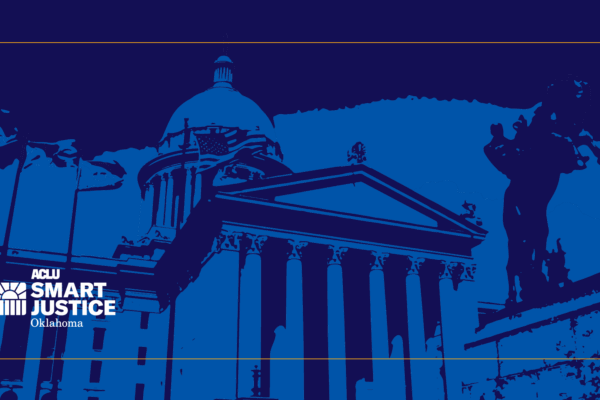OKLAHOMA CITY - Senate Bill 711, on the House Public Safety Committee agenda for Thursday, is a dangerous and laughable effort to increase prosecutorial leverage against the accused while fueling Oklahoma’s mass incarceration crisis and adding to the racial disparities that exist in Oklahoma’s criminal justice system.
SB 711 modifies the definition of a “criminal street gang” to include anyone “soliciting, inducing or enticing another to commit an act of prostitution” or anyone in possession of a firearm after a former conviction of a felony. Under the new language, it would be grounds to charge a member of a "gang" (defined as few as five people) with a felony for encouraging someone to make an appointment with a sex worker.
“This bill is not about human trafficking. There are already state and federal laws that outlaw this abhorrent practice. This bill exploits the very real concerns about human trafficking to force those accused of a crime into taking harsh plea deals regardless of whether the crime actually involves gang activity. If the prosecutors think we need to strengthen our human trafficking laws, there are more honest and effective approaches,” said Jill Webb, ACLU of Oklahoma Legal Director.
“By making the changes suggested by SB 711, the state is targeting those communities already overpoliced and disproportionately impacted by our criminal justice system, as well as working against reform efforts that aim to address Oklahoma’s dubious title as the number one incarcerator per capita in the world,” Webb said.
“SB 711 creates a new charge for things that are already crimes, allowing prosecutors to engage in the practice of stacking charges--where they pile on different offenses, in this case, different versions of the same crime, to create the possibility of more prison time and force defendants to accept otherwise unreasonable plea deals. As Senator George Young and Senator Kevin Matthews noted when this bill was heard in the Senate, the reality of this legislation is that it guarantees we will see more Oklahomans incarcerated with stacked charges, particularly black and brown people,” says Nicole McAfee, Smart Justice Campaign Manager for the ACLU of Oklahoma.
The desire and need for reform has repeatedly been made clear by an overwhelming, bipartisan majority of voters who are tired of Oklahoma’s ineffective criminal justice system. Oklahoma does not need to invest its time and money looking for new ways to put more people in cages, for longer sentences. SB 711 flies in the face of bipartisan legislation intended to make important reforms to Oklahoma’s criminal justice system by addressing diversion and treatment, making some previous sentencing changes retroactive, and doing away with our current two-tiered pay-to-play bail system that keeps thousands of presumed innocent Oklahomans locked away from their families, communities, and jobs before they have had their day in court.
# # #

